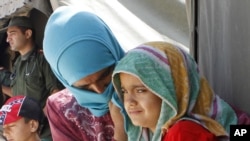Since the Syrian civil war began five years ago, nearly five million people have taken refuge in neighboring countries, primarily in Turkey, Lebanon and Jordan.
Currently, Jordan hosts around 636,000 Syrian refugees, increasing the Hashemite Kingdom’s population by about 10 percent. And there are tens of thousands more Iraqi refugees and Palestinian refugees from Syria.
This sudden upsurge in population puts a tremendous strain on the country’s infrastructure and institutions, impacting the government of Jordan’s ability to provide services for all people living within the country’s borders.
To help Jordan cope with the influx of refugees, the United States has re-oriented a number of its existing bilateral programs to account for the refugee situation, and has dedicated additional funding to focus on stresses caused by the Syria crisis, beyond the $730 million in humanitarian assistance provided by the U.S. government.
Over the past two years, the United States has more than double its economic aid to Jordan, to some $700 million in both 2014 and 2015. This money means new and expanded schools and health clinics for Jordanians and Syrians alike, food and credit card vouchers for refugees, and increased economic activity that will help stimulate Jordan’s economy.
But due to the brutality of the conflict, thousands of refugees have become disabled, including those who have lost limbs or suffered spinal cord injuries. And as the conflict becomes more and more vicious, the numbers of the injured increase exponentially.
Through a grant from the State Department’s Office of Weapons Removal and Abatement in the Bureau of Political-Military Affairs, a U.S. non-profit organization called the Polus Center for Social & Economic Development is partnering with Asia Development Training, Incorporated to build national rehabilitation capacity in Jordan.
The Polus partnership supports the Al Bader Center, the Al Hussein Center, Syria Without Borders, and the Al Salaam Center, which house victims of landmines and unexploded ordnance while they are fitted for a prosthetic and orthotic device. Polus also provides artificial limbs, wheelchairs, and braces, and trains refugees who have lost limbs, to help rehabilitate others. It is a small help to ease their suffering.
We hold in our thoughts the countless refugees around the world who have been displaced by conflicts and other events. The United States looks forward to partnering with other countries, civil society, and local organizations to support those who have been wounded in war and uprooted from their communities.














